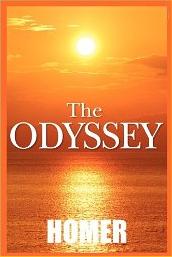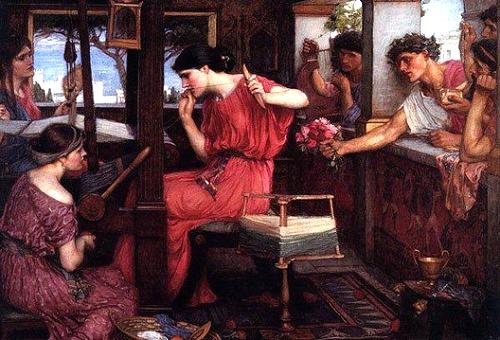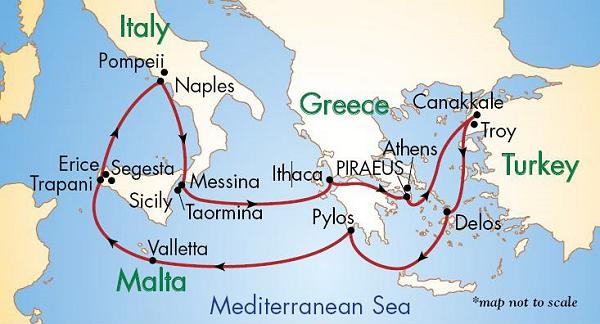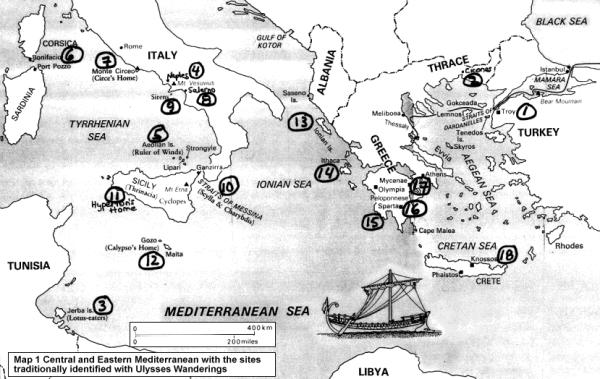The Book Club Online is the oldest book club on the Internet, begun in 1996, open to everyone. We offer cordial discussions of one book a month, 24/7 and enjoy the company of readers from all over the world. Everyone is welcome to join in.
Welcome to
The Classics Book Club, now discussing
Free SparkNotes background and analysis on the Odyssey
February 15-21: Book I: Meanwhile, Back in the Castle....
February 22-29: Books II and III: Telemachus, Nestor, and Agamemnon Penelope at her Loom
Penelope at her Loom
John William Waterhouse
1912 Maps:



Translations Used in This Discussion So Far:
kidsal: Alexander Pope, George Palmer
Dana: Fitzgerald
Gumtree: Butler, T.E. Lawrence, Cook, Rieu
EvelynMC: S.H. Butcher and Andrew Lang
Mippy: Lombardo
Roxania: Lombardo
Pedln: Pope, Fagles, Butler
PatH: Lombardo,
JoanR: Fagles
Frybabe: Butcher and Lang
Deb (bookad): Lattimore, E.V. Rieu
roshanarose: T.E. Lawrence.
JudeS: Fagles
Babi: Robert Fitzgerald
Mippy: Pope, Lombardo
ALF43: Butler (corrected in edit)
Babi: Pope? Fagles
BarbStAubrey: Fagles
straudetwo: Lombardo
rosemarykaye: Fagles
caroljwl: Fagles
JoanK: Fagles.
sandyrose: Rieu,Lombardo
ginny: Lombardo, Fagles, Pope, Murray, Butler
Homer and the Epic Form:
By definition an epic is a long narrative poem, written in lofty style and dealing with the preternatural exploits of a national hero. Certain accepted conventions mark the epic. The most important are these:
A:The theme is a series of adventures befalling a national hero.
B:The poem begins with an invocation of the Muse (the goddess of epic poetry, one of nine goddesses of poetry and of arts and sciences.)
C:The poem begins in 'media res'(in the middle of things) . What has happened before is told by flashbacks.
D:A classic ,dignified meter is used. In Greek & Latin dactyllic hexameter.
The Stock Epithet
Homer uses many stock epithets, the conventionalized adjective or descriptive phrase applied again and again to persons and things.Morn is usually rosy fingered;the sea is wine dark or loud resounding;Odysseus is brilliant Odysseus or Odysseus of many wiles. Scholars realized that the poet used set combinations , of noun and epithets as building blocks to fill out his six foot lines .Brilliant Odysseus for for a two foot space and for a three foot space he had Odysseus of many wiles.This became an accepted device for Greek epic style---(From
Greek & Roman Writers by McNiff)--- Submitted by JudeS
This is off-subject from the Odyssey, but does address ancient language, to answer a post above:
Barb St A. wrote: I did not know Hebrew was a language not typically used - was there a part of the world that used Hebrew as compared to other parts of the Jewish population spread all over before WWII? What is the difference between Yiddish and Hebrew? Since the First Diaspora of the Jews, in the 8th-6th centuries, B.C., Hebrew had been used in prayers and, at some period in time, to write out the Five Books of the Old Testament, but no country in the world had a Hebrew-speaking population for centuries. At the founding in 1948 of the state of Israel, which had been called Palestine under the British Mandate (1923-48), there was considerable controversy about what the language of the new state would be, with some politicians suggesting Yiddish, some even suggesting English, but
Hebrew won out. It's difficult to learn, but is wonderful!
Yiddish is a "mash-up" of Hebrew, German, and a little English. It was widely spoken in Eastern Europe, Poland, and the Pale in Russia, and widely used in theater, including vaudeville, and newspapers, and was the published language of many famous novelists and essayists.
I watched my grandparents reading Yiddish newspapers as a child and was puzzled by the Hebrew characters in which they were written. Yiddish theater has almost ceased to exist, although in New York City there have been many attempts to revive it. Yiddish is a rich and beautiful language, but has, likewise, no country to call home in the 21st century.



